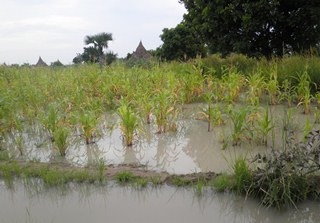Payinjiar County hit by hunger after 2012 floods
By Bonifacio Taban Kuich
January 3, 2013 (BENTIU) – Hunger in Unity State’s Payinjiar County is reaching crisis levels, according to local residents and officials following severe flooding last year, which residents say has wiped out their crops and food supplies. Some residents are fleeing to towns like Bentiu and Juba to find help and relief.

In October last year, Unity State’s deputy Governor, Michael Chiengjiek Geay warned that citizens living near the state capital, Bentiu would face severe hunger after floods destroyed most farms in the area.
He said six out of the nine counties in the state received poor harvests, due to unusually heavy rains experience since June.
Riek Doar, a resident of Gakal village in Nyal payam, was forced to flee from his home more than four months ago. He says it is becoming harder and harder to find food and the situation is getting desperate.
“The situation here is becoming very difficult due to severe hunger. The conditions are only getting worse, if the government does not take some action against this hunger we will all die”, said Doar.
Michael Thoar Gatpan, a senior inspector for Nyal payam district, says nearly all of the area’s crops have been destroyed by the rain and flooding. Authorities from the area have appealed several times to the United Nations and humanitarian agencies to provide assistance to the victims of the floods.
But with the area drying up and with food supplies running out, Gatpan says people may not be able to wait any longer.
Gatpan told Sudan Tribune in Nyal: “Our communities are still suffering since their crops were destroyed by heavy rain a lots of floods, so people are now looking for a place where they can be supported even some of them start to go to Bentiu or others place like Toich rivers where they can get little food for themselves.”
Six UN agencies assessed the area in October last year, to try and determine the humanitarian needs of the people in Nyal. The assessments called for rapid delivery of emergency food supplies for the victims. But Gatpan says Nyal is remote and getting food to the village has proven to be a monumental task.
Riek Doar says the government should work hand in hand with humanitarian organizations to swiftly resolve the hunger issue.
“They should be together listening to our voices, crying for help. If they worked together, perhaps they could eradicate our hunger. It would be great if the government could help us solve these problems”, said Doar.
Payinjiar is one of the most inaccessible of Unity State’s nine counties. State officials claim they will soon begin renovating a road from the Unity State capital of Bentiu to Payinjiar County so that NGOs can reach this remote area. But residents say that actions speak louder than words.
The United Nations Office for the Coordination of Humanitarian Affairs (OCHA), in its October bulletin, said that flooding from seasonal rains incidents had affected at least nine of South Sudan’s 10 states.
The worst affected areas, it said, were “parts of Jonglei, Lakes, Northern Bahr el Ghazal, Unity and Upper Nile states”.
“Most floods so far have not warranted major humanitarian interventions due to their predictable and localized nature. The humanitarian community continues to monitor the situation and conduct rapid needs assessments to determine any need of humanitarian assistance for flood-affected people,” the bulletin reads in part.
To-date, access to some flood-affected areas, according to UNOCHA, remains limited due to weak infrastructure affected by the heavy rains, while insecurity in Jonglei and Unity states reportedly hampered assessment missions in its flooded areas.
Last year, however, the country’s ministry of health established an emergency flood task force. In addition, surveillance of flood-affected counties is now reportedly taking place across South Sudan.
(ST)
